The Sports Report Olympics Edition: The taste of Tokyo freedom
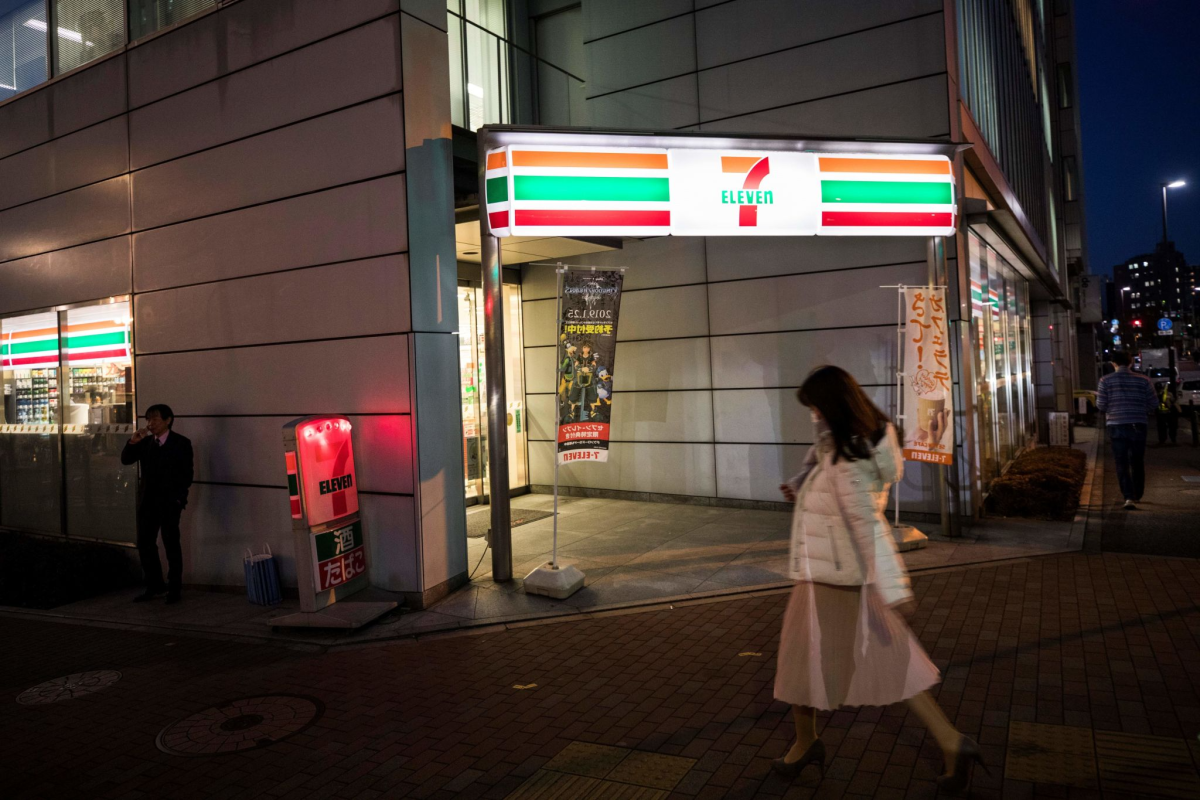
- Share via
TOKYO — Good morning from Tokyo, where thousands of journalists have recently been granted their freedom.
Food freedom.
My name is Ben Bolch, hungry curator of this edition of the Olympics newsletter, and I’m ready to be unleashed into this city of culinary delights. Before we discuss the need to satisfy my cravings, let’s get to the big stuff at these Tokyo Olympics:
Latest Olympics news and results
Thursday and Friday TV schedules
For the first 14 days journalists covered these Summer Games, they were on live-shrimp lockdown. That meant there was no taking an Uber to that trendy tempura place you read about. No wandering into that enticing sushi joint in the alley next to your hotel. Even heading over to Starbucks and taking a seat to sip your latte was a big no-no.
Media were permitted outside their hotels for only 15 minutes, except for boarding dedicated buses or taxis to Olympic venues. That was enough time — if you were lucky — to grab some convenience-store sushi or a plastic bowl of cold seafood linguine at the nearest 7-Eleven.
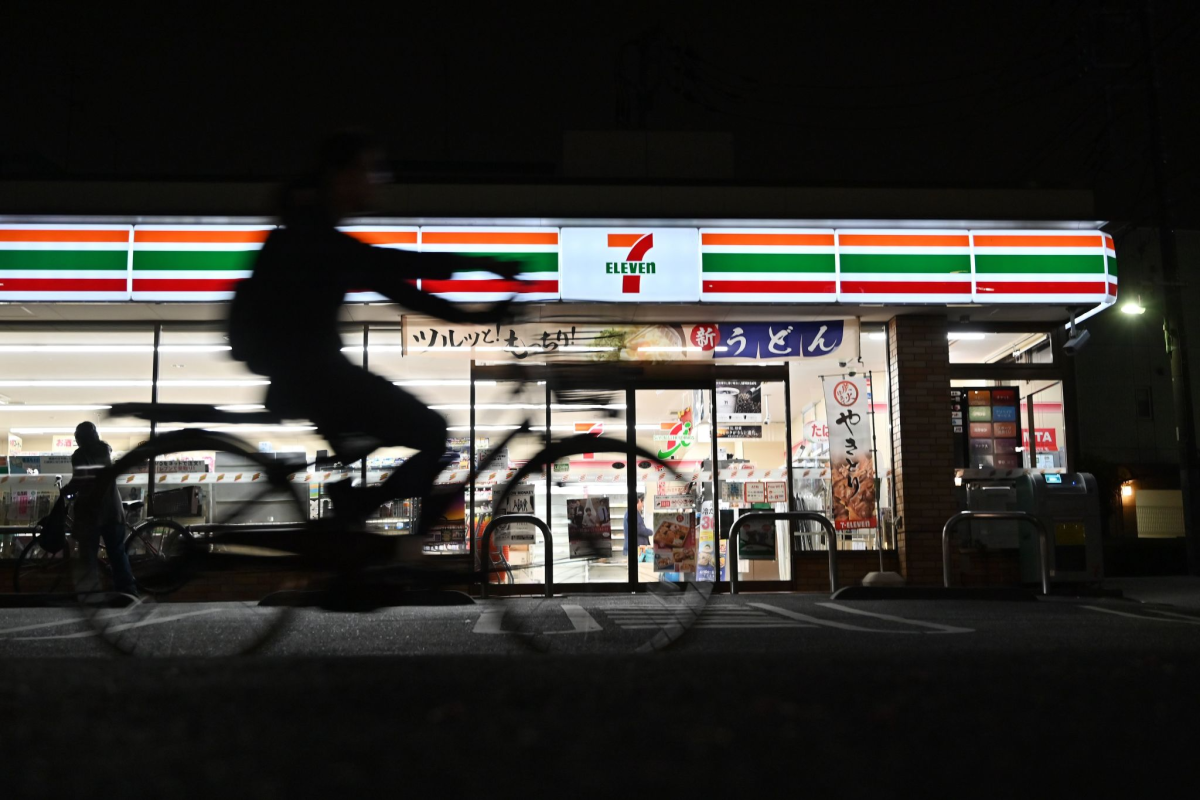
I ordered takeout from Yoshinoya — no eye rolls, please — on one of the first nights and went two minutes over my allotted time limit because they didn’t accept credit cards, sending me on a mad dash to the nearest ATM. I worried for the next two days that I was also going to be sent on the next plane back to LAX.
That all changed Wednesday, when those who had not arrived long before opening ceremony were finally permitted to cleanse their palates of Uber Eats deliveries and the sad, lifeless bento boxes that have populated the sporting venues.
So what was my first taste of freedom? The same breakfast I’ve had every day. Hey, it’s free. I handed over my breakfast coupon in the lobby café of the Nishitetsu Inn for another heavenly matcha croissant — one of the rare culinary finds of this trip — and a “raw ham” sandwich that was a sort of Japanese prosciutto.
Go beyond the scoreboard
Get the latest on L.A.'s teams in the daily Sports Report newsletter.
You may occasionally receive promotional content from the Los Angeles Times.
After watching the United States women’s volleyball team dominate the Dominican Republic, I returned to my hotel while completing another familiar ritual. I timed an Uber Eats delivery so that Hirofumi could step off his bicycle and cheerfully hand me the two beef kebab wraps and potatoes (with a mysterious orange sauce) around the time I arrived in the hotel lobby.
I beat my new friend by a couple of minutes, allowing a hurried stop at 7-Eleven for some drinks on another sweltering day, but it worked out well enough. The kebabs were fresh and savory, the beef seasoned perfectly, but the potatoes were a bit limp and I could have done without the dreadful sauce they were slathered in.
At some point before heading home, I’m hoping to have an enjoyable dining experience inside a restaurant. Sushi would be great, but I’m not picky. A friend recommended Savoy Pizza and I’m sure colleague Dylan Hernandez, who speaks Japanese and has graciously served as a de facto tour guide for the Los Angeles Times journalists here, has some ideas.
The biggest obstacle to a group dinner is workdays that can push 20 hours and schedules that rarely align. But at least the opportunity to eat something besides another banana and peanut butter crème sandwich—the staples of the media work areas—has arrived.
Bon appetit, or as they say here, itadakimass.
Enjoying this newsletter? Consider subscribing to the Los Angeles Times
Your support helps us deliver the news that matters most. Become a subscriber.
Track and field
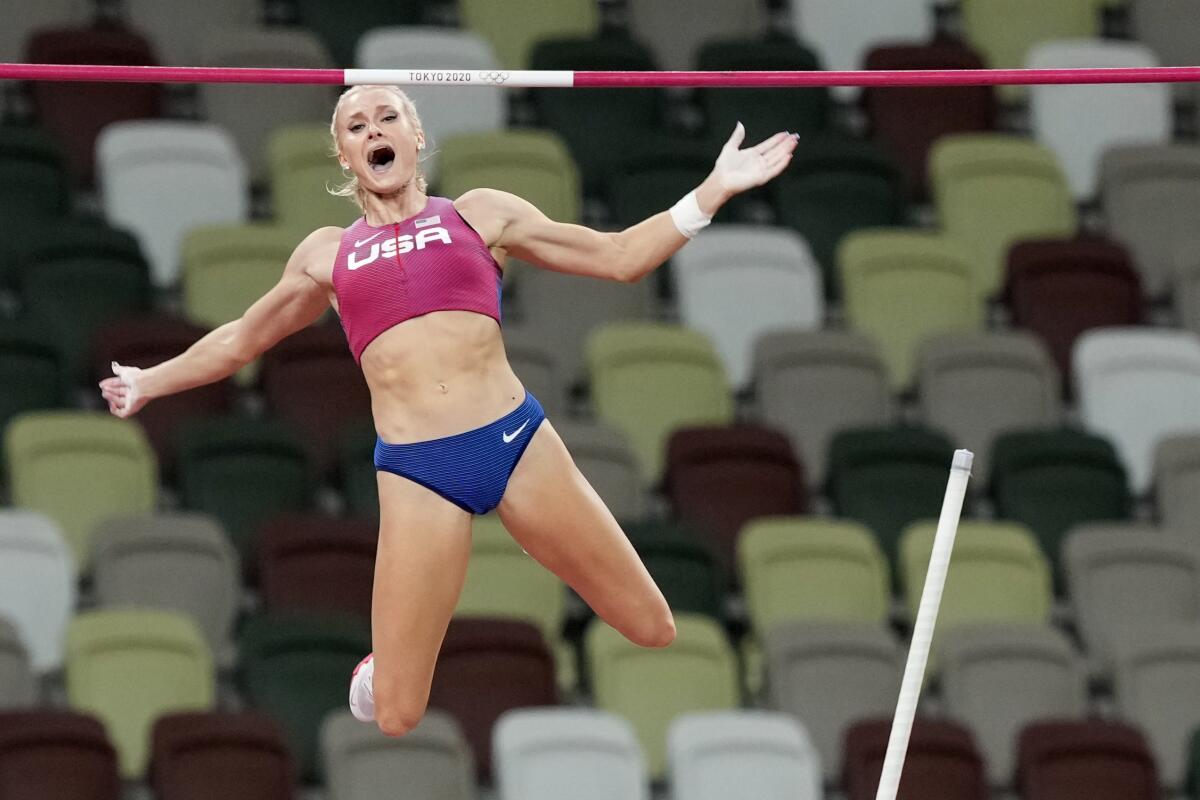
Gary Klein on track and field: Katie Nageotte of the United States won the gold medal in the women’s pole vault on Thursday night at Olympic Stadium.
Nageotte won with a mark of 16 feet 0¾ inches.
Anzhelika Sidorova, competing as an authorized neutral athlete, took silver, Holly Bradshaw of Britain the bronze.
———
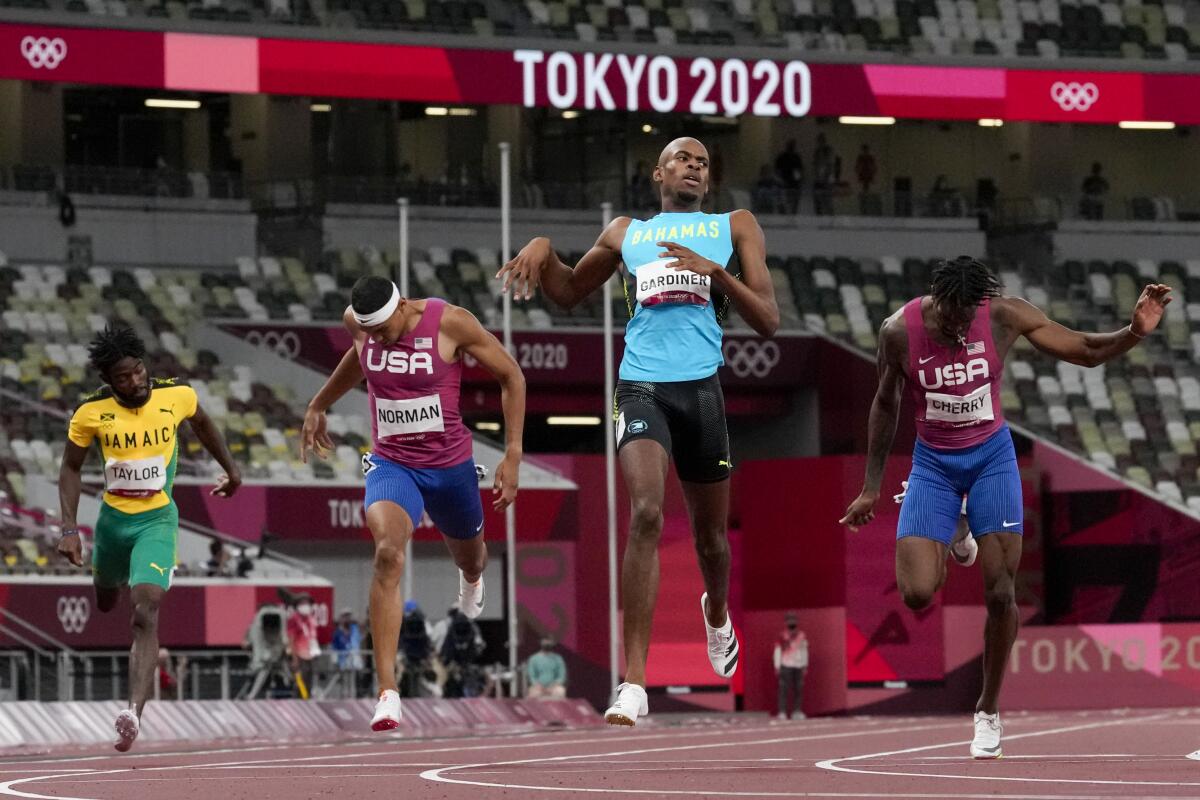
The United States men’s track team suffered another disappointment Thursday night at Olympic Stadium, where Michael Norman and Michael Cherry finished out of the medals in the men’s 400 meters.
Steven Gardiner of the Bahamas won the gold medal, finishing in 43.85 seconds.
Anthony Jose Zambrano finished in 44.08 to earn the silver medal, and Kirani James of Grenada finished in 44.19 for bronze.
Cherry was fourth in 44.21, Norman fifth in 44.31.
———
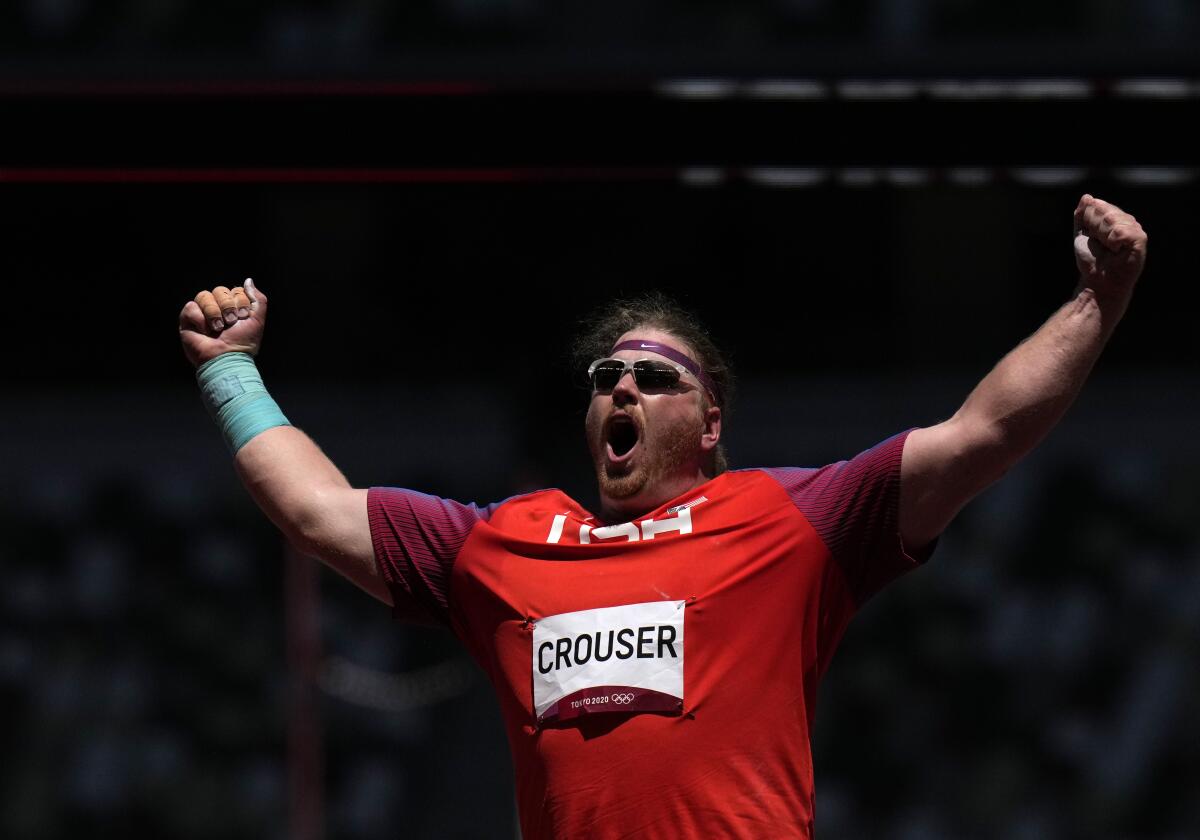
Ryan Crouser sent a couple of messages on Thursday.
The 2016 Olympic gold medalist and world-record holder in the shot put defended his title, winning with an Olympic record throw of 76 feet 5 ½ inches at Olympic Stadium.
Afterward, Crouser took out a piece of paper. It had a note penned to his late grandfather, Larry, who died just before Crouser left for Tokyo to compete in the Olympics.
“GRANDPA, WE DID IT. 2020 OLYMPIC CHAMPION!”
Crouser said he took his first throw in his grandfather’s backyard.
“The day before I had to leave, I threw a shot, and it went right through the roof of his garden shed, so I had to go back the next day and replace that,” Crouser said. “He played a huge role in my throwing career.
“So, to lose him the week before coming to the Olympics obviously was sad. But I feel like he was able to be here in spirit.”
Men’s basketball
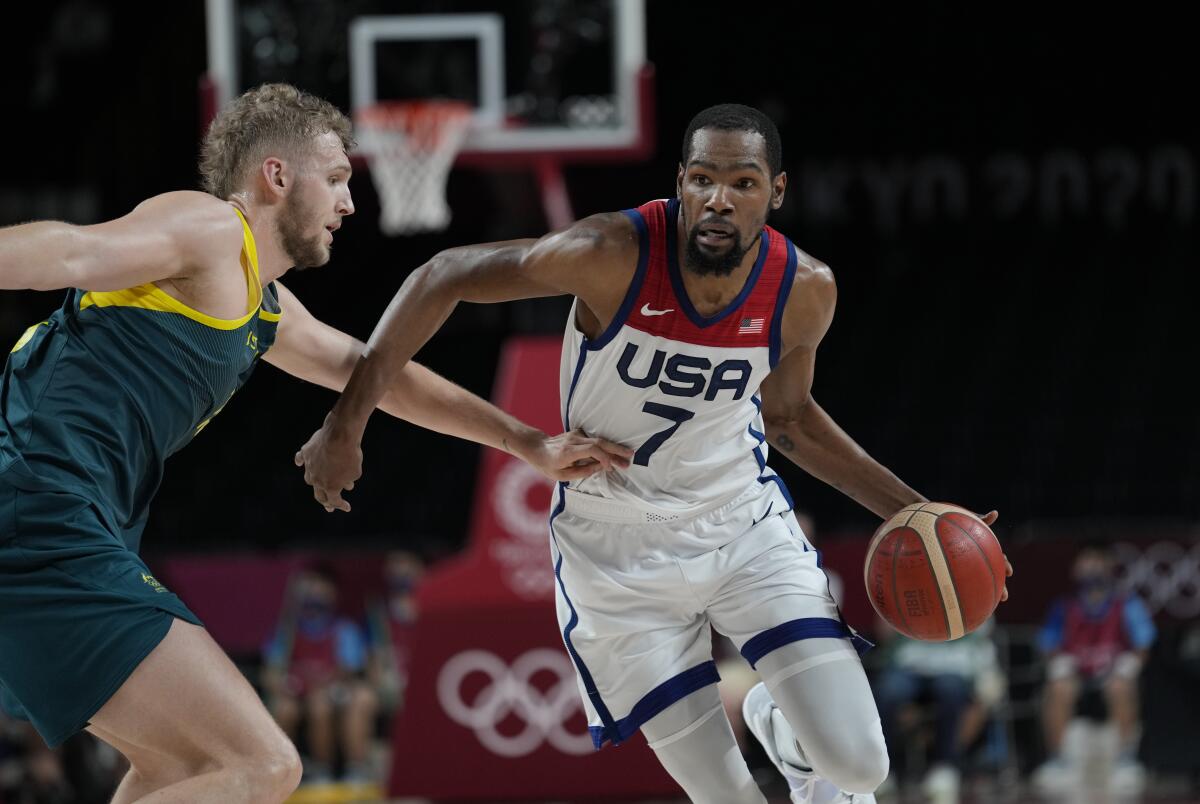
Helene Elliott on the U.S. men’s basketball team: With two gold medals to match his two NBA championships with the Golden State Warriors, Kevin Durant had nothing to prove by playing in his third Olympic basketball tournament.
After sitting out the 2019-20 NBA season to recover from the torn Achilles’ tendon he had suffered during the 2019 Finals — and after playing only 35 games for the Brooklyn Nets in the reconfigured 2020-21 season — it would have been reasonable for Durant to skip the Tokyo Games and avoid subjecting his 32-year-old body to additional travel and stress. LeBron James, Anthony Davis and Stephen Curry are among the superstars who stayed home. Given the COVID-delayed ending to the NBA season, their decisions didn’t stir much of an outcry.
But U.S. coach Gregg Popovich was prepared to put aside his pride — no easy task for the longtime San Antonio Spurs coach — and go to extremes to get Durant to commit to playing in Tokyo.
“If he said no, I would have begged, cried, done anything I could to change his mind,” Popovich said during a pre-Olympic training camp in Las Vegas in July. “That’s pretty obvious. But what it says about him, number one, is that he loves the game. He really loves to play basketball. He loves to win. He loves the camaraderie. He wants to be part of this all the time, as we all know. And that’s his motivation.
“At the core, that’s what he loves to do. And luckily for all of us, that’s who he is. So it’s a testament to his character and just desire to be part of a team and have a challenge and seek the success.”
Women’s soccer
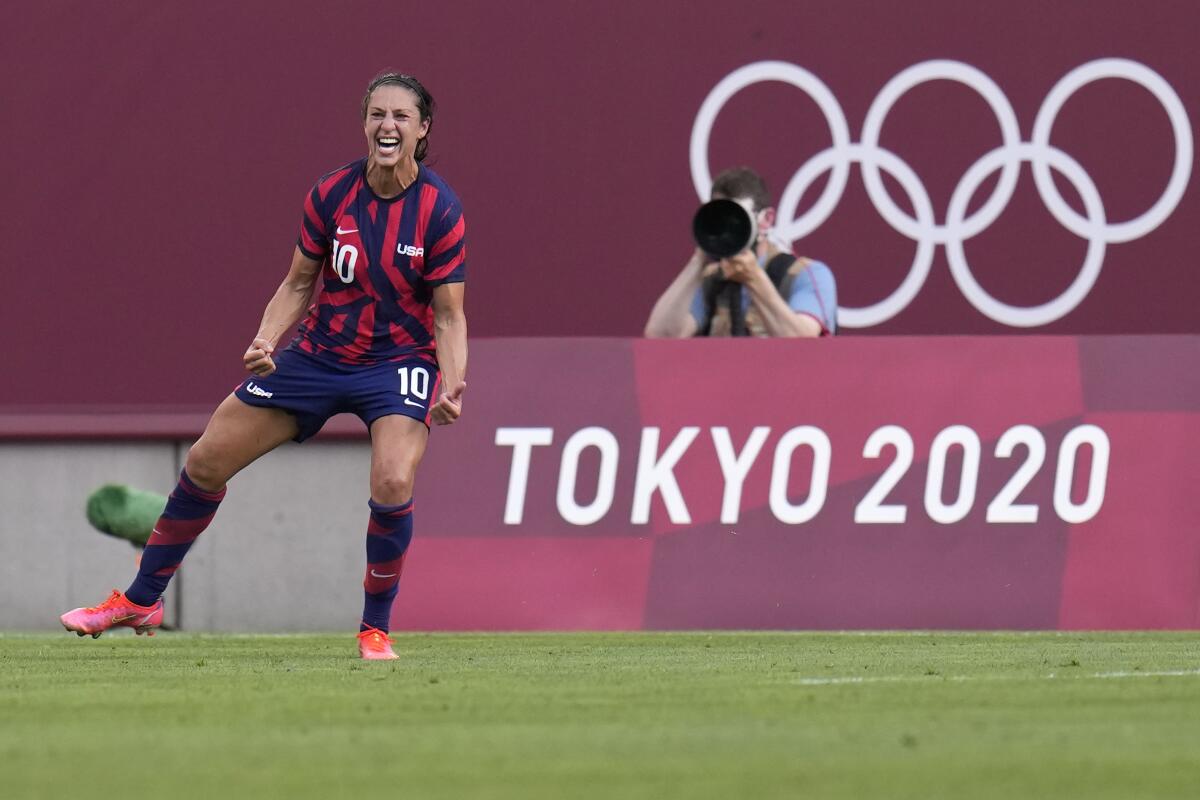
Kevin Baxter on U.S. women’s soccer: If it’s possible to put a positive exclamation point at the end of an otherwise dismal tournament, the women’s national team did just that Thursday, bowing out of the Tokyo Olympics with a dominant 4-3 win over Australia behind two goals each from Megan Rapinoe and Carli Lloyd.
The victory earned the women a bronze keepsake of a tournament they’d just as soon forget. But if it was the last competitive game for some on the U.S. roster, they gave a final performance that was a worthy coda to a remarkable era.
With an average age of 30.8 years, the Tokyo roster was the oldest ever for a U.S. Olympic team. And in the oppressive heat and humidity of the Japanese summer, the players at times looked every bit as old as their passports say they are.
Nothing seemed to go right in these Games for the U.S., the two-time reigning World Cup champions. They came to Tokyo having gone 2½ years since their last loss and four years since they were last shut out. Both streaks ended in the first group-play game, a 3-0 loss to Sweden.
Beach volleyball
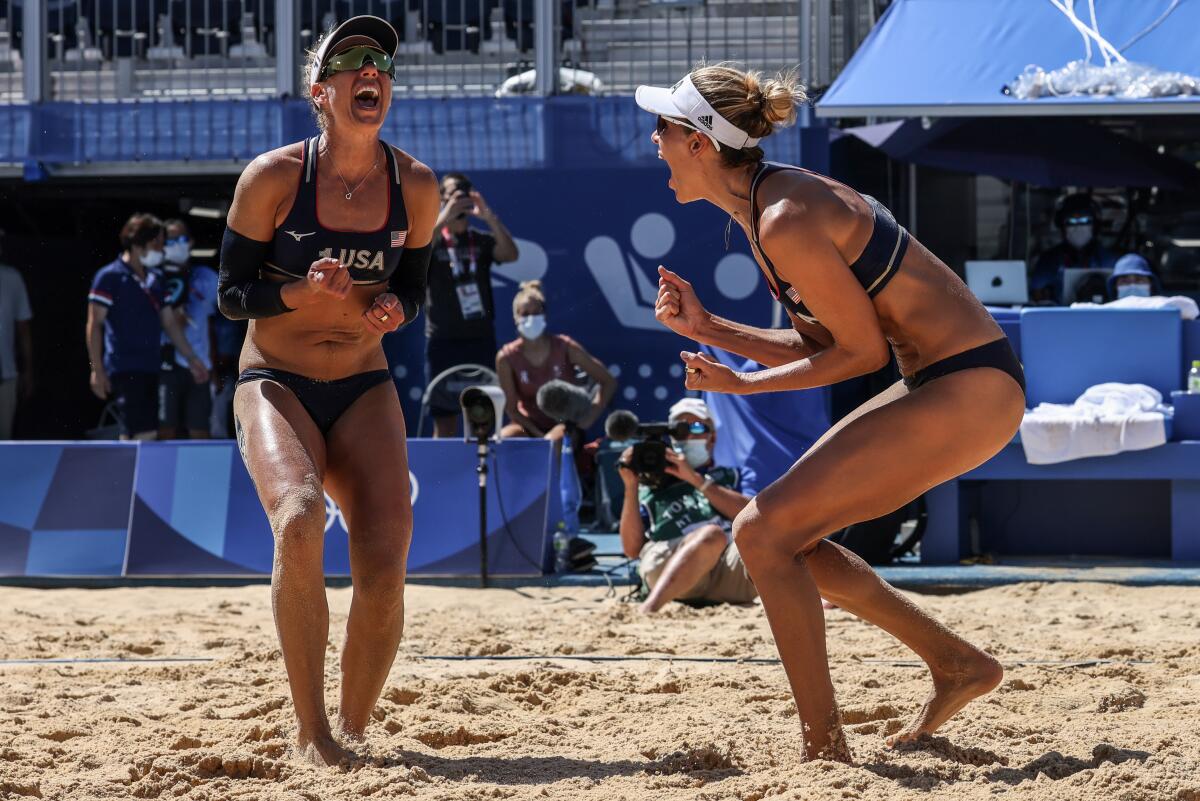
Nathan Fenno on beach volleyball: In a scrap of shade at Shiokaze Park, April Ross and Alix Klineman rested amid screeching cicadas and shirt-soaking humidity that pushed the heat index to 99 degrees.
Like everything else the American beach volleyball duo has faced at the Summer Games, the sweltering morning didn’t faze them.
“I feel like I’m getting used to it,” said Klineman, the first-time Olympian from Manhattan Beach.
The same could be said for their romp through the bracket, in which they have won six times and dropped only one set on the way to the gold-medal game.
That included the duo making quick work of Switzerland’s Anouk Verge-Depre and Joana Heidrich 21-12, 21-11, in a semifinal Thursday.
Water polo
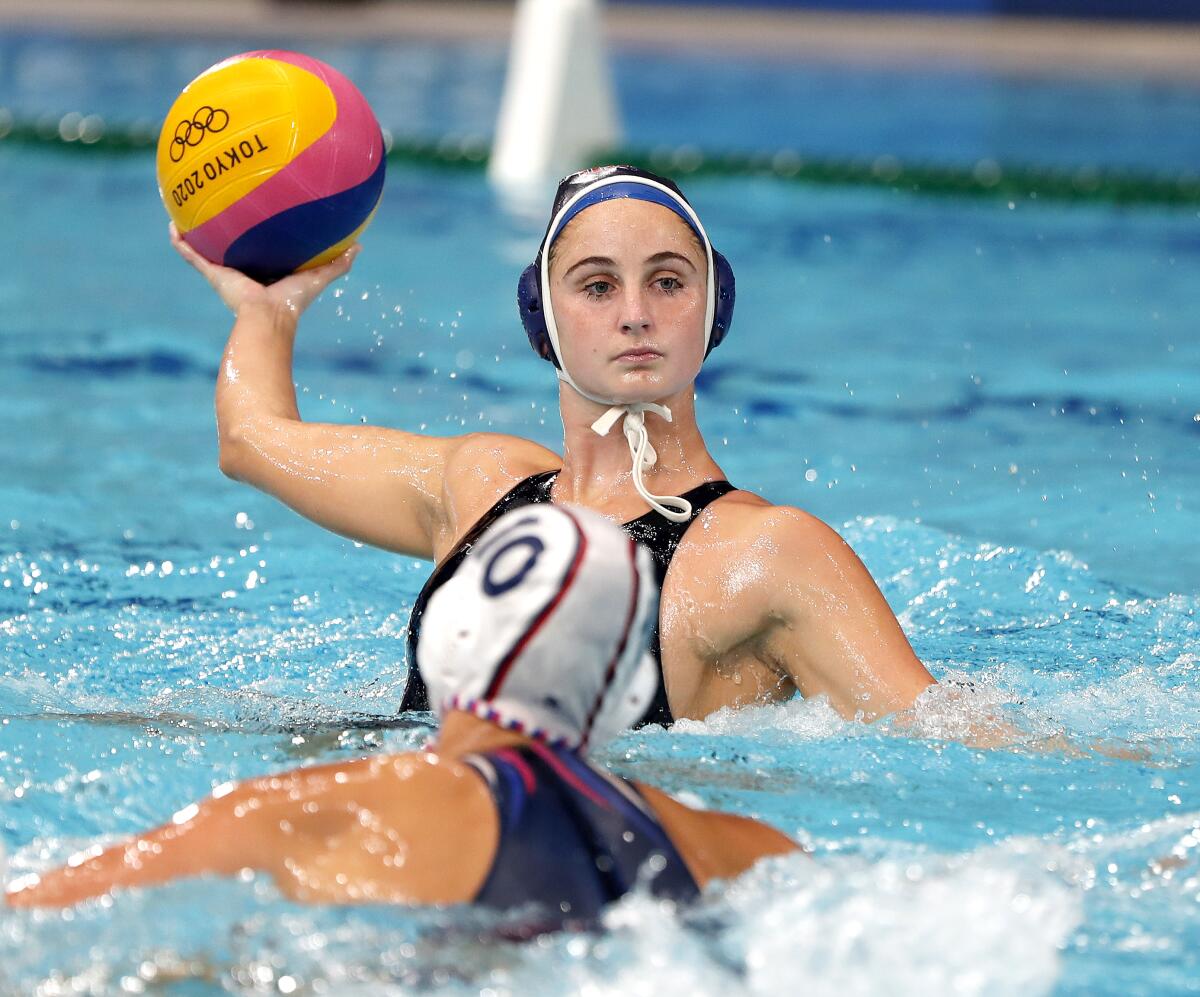
Ben Bolch on U.S. women’s water polo: Pick a sport, any sport, and it was likely to have been played by the inhabitants of Maddie Musselman’s childhood home.
Her father was a left-handed pitcher with the Toronto Blue Jays and New York Mets known for his slider and curveball. Her mother won two varsity letters in soccer at Rutgers. Her older sister was a part-time starting goalkeeper for the UCLA women’s water polo team.
Maddie initially swam and played soccer growing up in Newport Beach before signaling her intentions in middle school. In her sixth-grade yearbook, she was quoted as saying she wanted to be an Olympic water polo player.
That dream came true, and now she’s on the verge of fulfilling another.
Musselman’s four second-half goals powered the U.S. women’s water polo team to a come-from-behind 15-11 victory over the Russian Olympic Committee on Thursday in a semifinal of these Tokyo Olympics, putting the Americans one win away from a third consecutive gold medal.
Baseball
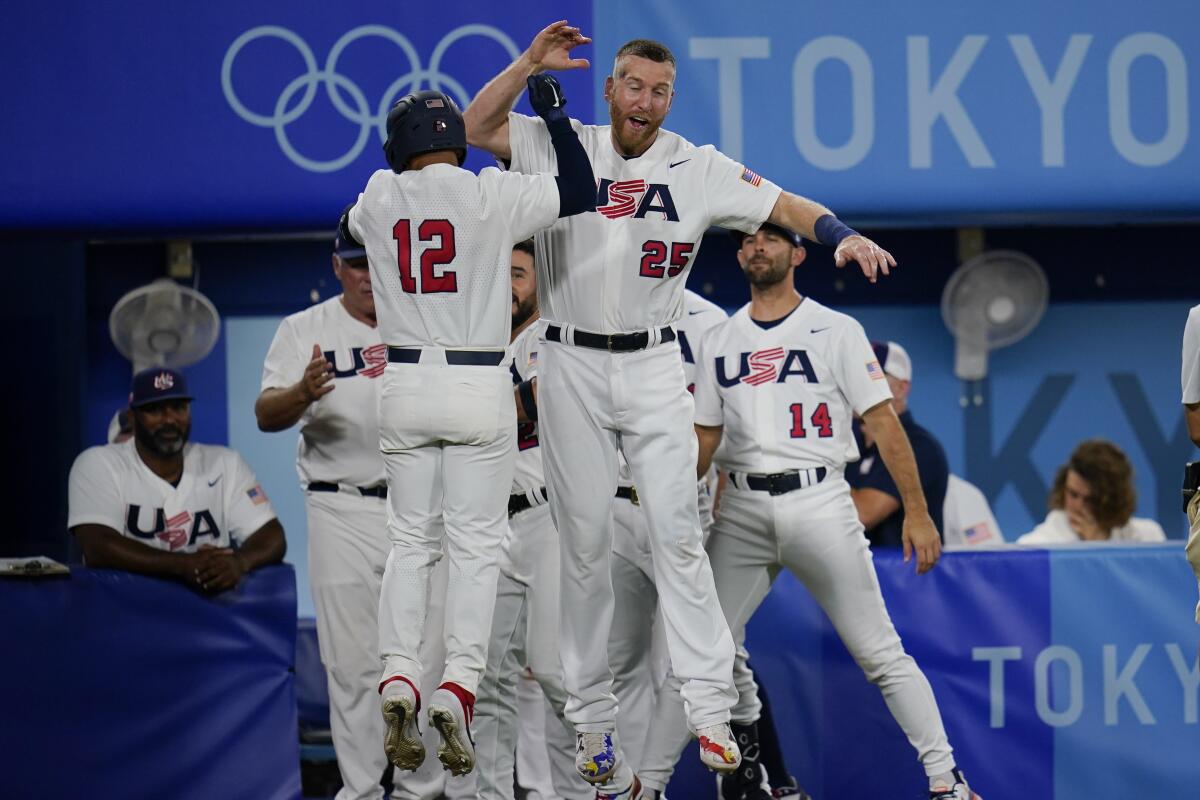
Jorge Castillo on the U.S. baseball: The U.S. pounced and didn’t relent Thursday, beating South Korea 7-2 at Yokohama Stadium to advance to the Olympic gold medal game in baseball for the first time since taking gold in 2000.
They’ll play Japan, the only undefeated team in the tournament, for the top spot on the podium Saturday night. The Japanese seek their first Olympic baseball gold medal since the sport first joined the Olympic program at the 1992 Barcelona Games.
South Korea will play for the bronze medal against the Dominican Republic on Saturday afternoon.
The U.S. didn’t face a deficit, taking the lead in the second inning, and surged ahead with a five-run sixth. Joe Ryan gave up a run on four hits across 4 1/3 innings before four relievers held the Koreans to one run over the final 4 2/3 frames. Left fielder Jamie Westbrook, center fielder Jack López and designated hitter Tyler Austin each had two hits. López and Austin finished with two RBI.
Skateboarding
David Wharton on skateboarding: The back of Keegan Palmer’s shirt read “Australia.” It might as well have been San Diego.
The 18-year-old skateboarder who won gold in the park contest at the Tokyo Olympics on Thursday was born in Southern California, moved down under for about 14 years, then returned four years ago for a very specific reason.
“There were really good training parks to train for this event,” Palmer said. “If you know San Diego, you know that’s what skateboarding is.”
Japan-South Korea rivalry
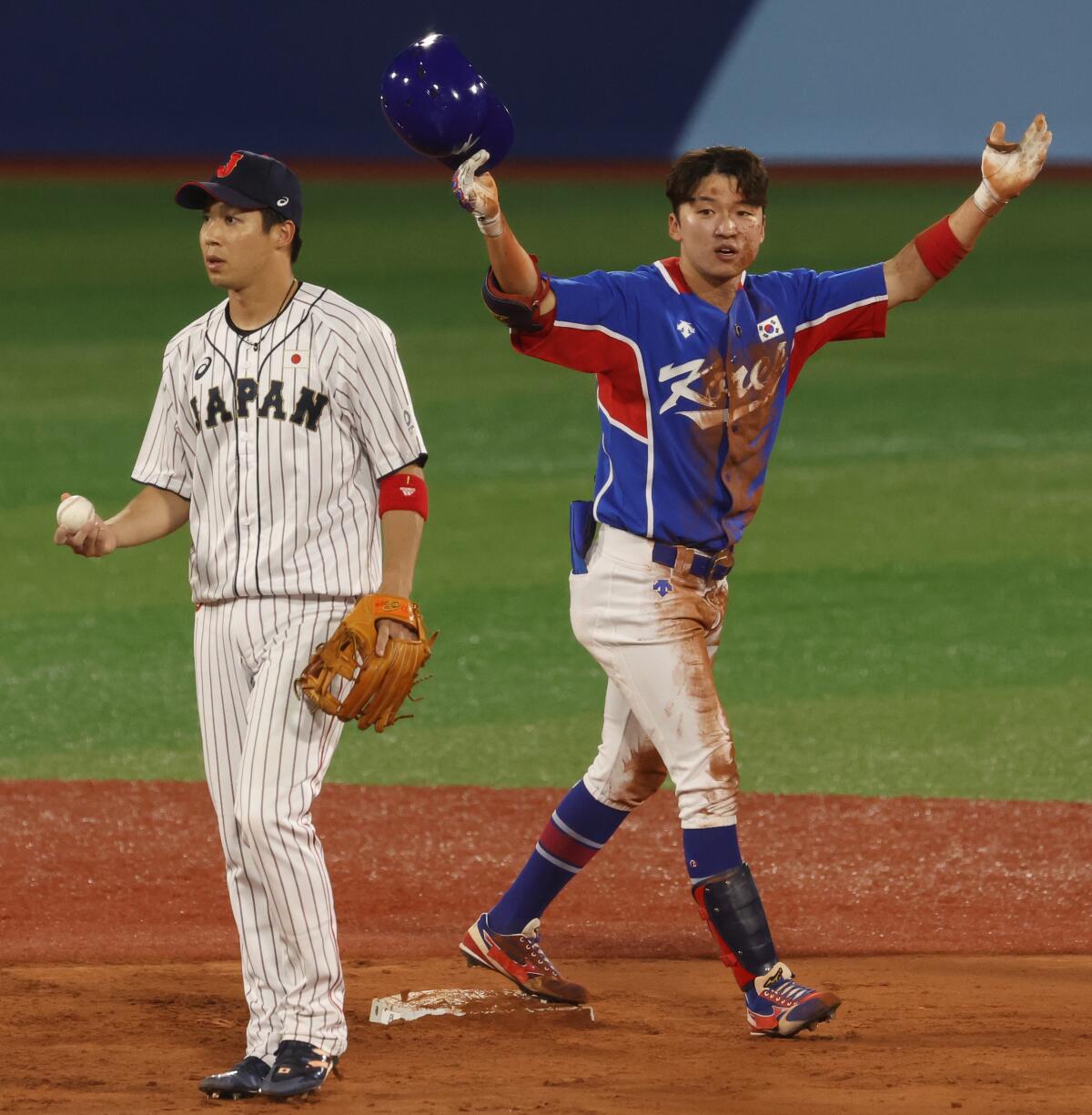
Dylan Hernández and Victoria Kim take a close look at Japan vs. South Korea in the Tokyo Olympics: For about three hours Wednesday night, enthusiastic fans in Japan and South Korea tuned into a sporting event that for many represents something more than a just a part of competition during the Olympic Games. Times sports columnist Dylan Hernández, a Japanese Salvadoran American Angeleno, and foreign correspondent Victoria Kim, a Korean American Seoulite, watched a baseball game between two bitter rivals in Tokyo’s Koreatown to explore questions of identity and historical baggage and why this matchup was much more than a game.
Japan’s colonization of Korea in the early 20th century has left long scars that have manifested in active political controversies that continue to simmer today. The neighboring nations are deeply connected yet entangled in a web of emotions and historical resentment that heighten the stakes when they are on opposites sides, whatever the occasion.
Dylan: Living in Los Angeles prepared me for the worst.
I spent plenty of nights throughout my childhood at the Coliseum watching soccer games between teams from Mexico and El Salvador, the country of my father’s birth. There were always fights in the stands.
Once, I watched the pay-per-view telecast of a boxing match between Felix Trinidad and Fernando Vargas at a Glendale bar. After the Puerto Rican Trinidad stopped the Mexican American Vargas, someone was knifed in the parking lot.
Until next time...
That concludes today’s newsletter. If you have any feedback, ideas for improvement or things you’d like to see, email us at sports@latimes.com. To get this newsletter in your inbox, click here.
Go beyond the scoreboard
Get the latest on L.A.'s teams in the daily Sports Report newsletter.
You may occasionally receive promotional content from the Los Angeles Times.




